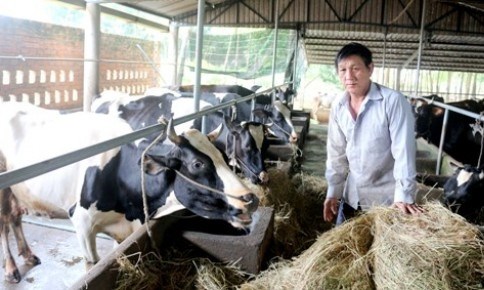Effective animal husbandry policies needed
Lack of effective policies hinders the development of the animal husbandry industry in Vietnam, experts said.
 A farmer feeds his cows in Tan Uyen town, southern Binh Duong province (Photo: nhachannuoi.vn)
A farmer feeds his cows in Tan Uyen town, southern Binh Duong province (Photo: nhachannuoi.vn)Hanoi (VNA) – Lack of effective policies hinders the development of the animal husbandry industry in Vietnam, experts said.
Over the past few years, a lot of preferential policies have been issued by the Government to encourage investors to pour money into agriculture. But some of these policies, including the credit policy, have not improved efficiency.
Tong Xuan Chinh, Deputy Head of the Department of Livestock Production under the Ministry of Agriculture and Rural Development (MARD), said that despite Government incentives providing loans for large scale farms, agencies faced a lot of difficulties in implementation.
Decree No 55/2015/ND-CP, prescribing credit policies for agriculture and rural development, was considered a breakthough for restructuring agriculture and the economy. Under the decree which took effect on July 25 last year, credit institutions may consider the provision of loans to customers with or without asset mortgages.
The decree allows credit institutions to raise the level of lending without collaterals by a factor of 1.5-2 times higher than before. An individual, business household, co-operatives or farm owners can take loans ranging from 50 million VND (2,240 USD) to 3 billion VND (134,520 USD), depending on location and production.
Farmers’ demand for accessing loans to develop production was high, but the number of households receiving loans with interest rate of less than 11 percent per year remains low, Chinh said.
Although borrowers without collaterals can seek credit, they must submit their land use rights certificates or written certifications from commune-level People’s Committees to lenders, documenting that they have not yet been granted land use rights certificates and that their land is dispute-free.
This requirement is hard for borrowers to satisfy since most households and co-operatives rent land, Chinh said.
In addition, breeders have difficulties regarding collaterals because banks do not accept the use of property, such as livestock and facilities, as collateral for loans, Chinh said.
Another hindrance preventing the agriculture sector’s development is the Government’s policy on land aggregation, experts said.
Many big enterprises have expressed their desire for adequate land to apply new technology. But the issue remains unresolved because under the current Land Law, land aggregation is prohibited.
Ta Van Tuong, Director of Hanoi’s Livestock Development Centre, said at present the areas for livestock breeding are either households or are leased for only five to 10 years, so households hesitate to invest in production for fear of losing their money.
Planning is also an issue for the livestock breeding industry.
According to Le Ba Lich, Chairman of the Vietnam Feed Association, the MARD has not created a plan for the industry yet.
The planning was decided by each locality and not many incentives were provided for households and enterprises engaged in livestock breeding.
Dong Nai Province, the country’s biggest livestock farming province, is one example, Lich said.
The province has set up a plan for the establishment of 11 concentrated livestock farming zones with over 1,400ha in a number of districts by 2020. But it remains just a plan, so no preferential policies for investors were mentioned.
This was unfair, in comparison with those who invested in industrial zones, who enjoy Government support in accessing electricity and water, as well as roads.
Investment in livestock breeding, without central or local authority assistance, occur not only in Dong Nai but also in other provinces, Lich said.
To attract big investors to the animal husbandry industry, Tran Duy Khanh, Vice Chairman and General Secretary of Vietnam Poultry Association, said the country should compile a master plan on the development of livestock breeding zones which promote links between local breeders and corporate buyers. This would help set up supply chains for big cities like Hanoi, HCM City and Da Nang, he said.
The Government should also revise polices in accordance with investor demand, with priority given to high risk areas such as creating animal breeds and tackling environmental issues relating to carbon credits for greenhouse gas emissions in the agricultural sector, Khanh said.
It must adopt policies to attract investors to the industry, as well as to ensure financial resources for it, he said.-VNA













